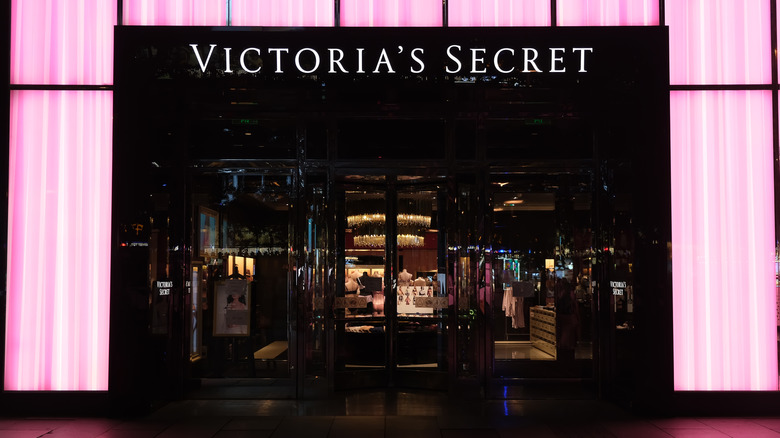Victoria's Secret Is Closing More Stores In 2025 And The Reason Couldn't Be Clearer
At a time when more and more retail and restaurant chains are facing bankruptcy, it's no wonder that a large brand like Victoria's Secret is similarly struggling. While many retailers — like the iconic retail giant Macy's — can point to the negative impact of the COVID-19 pandemic on sales growth, Victoria's Secret's problems actually started showing up to two full years before the start of the pandemic. In fact, they shut down of 30 stores back in 2018. In 2019, the brand followed that up with another 53 store closures, which the at-the-time EVP and CFO Stuart Burgdoerfer suggested was due to declining sales performance. In 2019 his represented 4% of the brand's worldwide locations — with 1,143 stores remaining.
Things only got worse from there for the lingerie giant, after early pandemic sales reports forced the company to permanently shutter brick and mortar stores. The first quarter of 2020 revealed a 37% dip in sales from the year previous, nosediving from $2.63 billion to $1.65 billion. A strategic pivot resulted in the closure of 241 more stores that year, followed by 50 in 2021, and 20 more in 2023. Now it's possible Victoria's Secret could close even more stores in 2025. Here's how Victoria Secret got to this place, and why the closures could actually be a strategy for a successful comeback.
Understanding Victoria's Secret's decline
The rise of big competitors like Target and Walmart — who began offering more affordable undergarments options for women like $22 and under bras. were already damaging Victoria's Secret's brand pre-pandemic. In fact, according to data from GlobalData Retail, per CNN, behemoths like Amazon and American Eagle's Aerie took an estimated 3.8 million customers from Victoria's Secret between 2017 and 2019.
The company was also not internally set up for success once the pandemic started. Considering how pandemic store closures hurt Victoria's Secret, you might assume that the company didn't have an online store. However, Victoria's Secret was actually ahead of the curve — building and launching their own e-commerce platform in 1998. At the time, however, e-commerce was still new, and the company remained more focused on in-store experiences. As a result, the company was slow to upgrade its online presence and strategy — which did not help the brand weather the pandemic.
With that said, closing brick and mortar stores to instead invest in online sales — and embrace the mobile shopping trend — is an increasingly necessary strategy for retailers. In fact, Victoria's Secret's acquired online-only retailer Adore Me in 2022, and its online sales did better than its retail outlets in 2023, though only marginally. In 2024, the company partnered with Google Cloud's AI systems to upgrade consumer experiences in their online store — by making browsing and searches more user-friendly. This also includes future plans to integrate a generative AI-powered conversational salesperson into your shopping experience.
Victoria's Secret's image problem
Former Chief Marketing Officer Ed Razek did not help customer's opinions of the brand when, in a 2018 interview with Vogue, he stated his unwillingness to present plus-sized or trans-women models — or undergarments designed for them. Ironically, this was even after noting the success of brands like Savage x Fenty, which has scored big for leaning into products and models that celebrate diversity. The New York Times also investigated accusations of rampant misogyny at Victoria's Secret, during a time when the brand's ads flaunted women in lingerie walking around Michael Bay-directed videos that included explosions and motorcycles. Victoria's Secret forgot it was selling undergarments to real women, with real bodies, who were not part of a male generated action movie fantasy and this turned off many customers.
In 2024, under the guidance of new CEO Hillary Super — the former CEO of Savage x Fenty — third quarter sales rose by 6.5% to $1.3 billion from the previous year, representing the company's highest quarterly growth in three years. A more inclusive marketing strategy that engages diverse Gen Xers, Millennials, and Gen Zers – with a broader assortment of everyday products including swimwear, comfortable sleepwear, sports wear, and body positive lines – points to a necessary brand realignment with its modern consumer's tastes and needs. In short, Victoria's Secret's closures are a recognition of the need to reenergize its brand, while modernizing and diversifying its sales platforms.


